Expatriate Life in Italy: Formal and Informal Institutional Environment Analysis
VerifiedAdded on 2023/06/10
|14
|2638
|176
AI Summary
The report concentrates on Italy as a destination and discusses the Formal as well as the Informal institutional environment. Recommendations and Conclusions based on this analysis have also been provided.
Contribute Materials
Your contribution can guide someone’s learning journey. Share your
documents today.

Running head: EXPAT LIFE
EXPAT LIFE
Name of the Student
Name of the University
Author Note
EXPAT LIFE
Name of the Student
Name of the University
Author Note
Secure Best Marks with AI Grader
Need help grading? Try our AI Grader for instant feedback on your assignments.
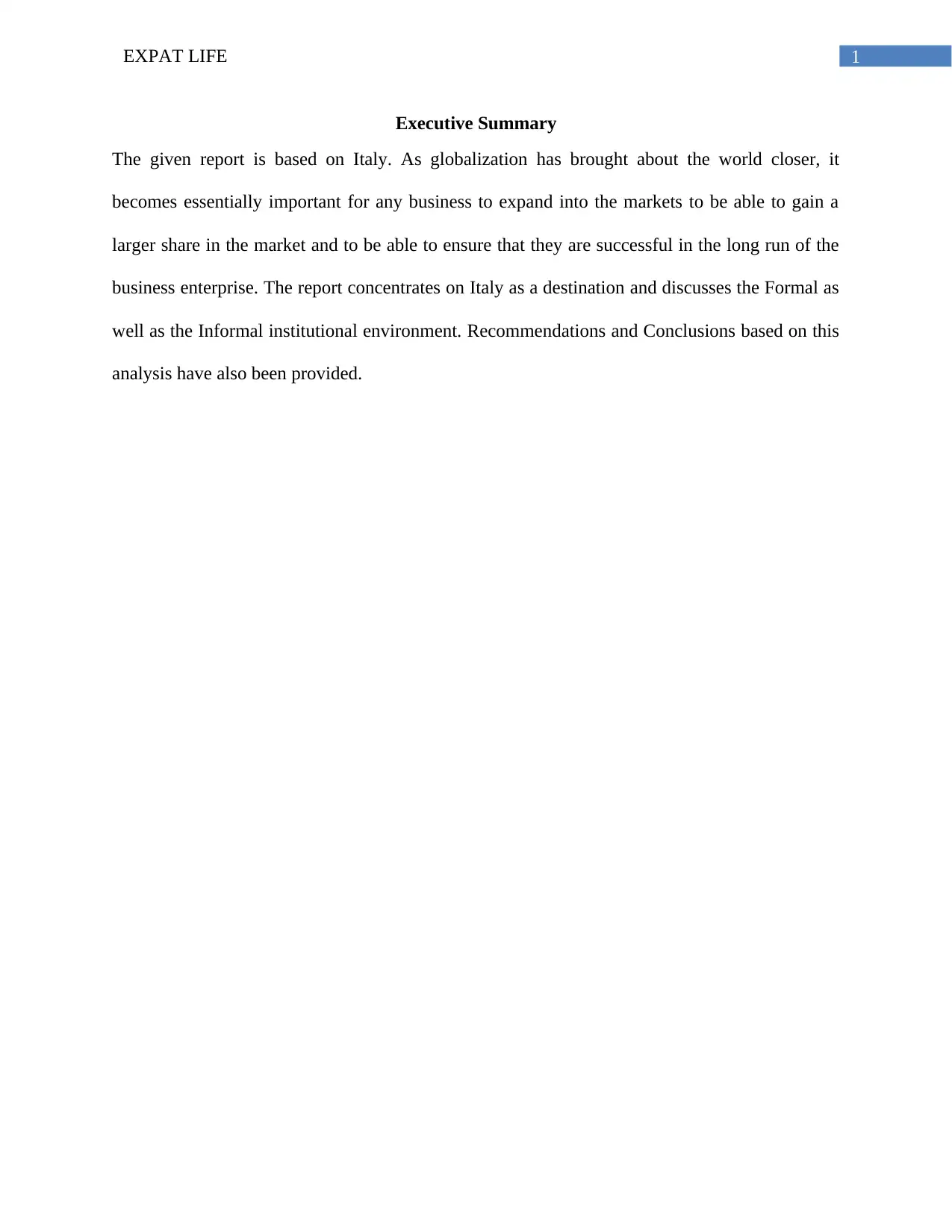
1EXPAT LIFE
Executive Summary
The given report is based on Italy. As globalization has brought about the world closer, it
becomes essentially important for any business to expand into the markets to be able to gain a
larger share in the market and to be able to ensure that they are successful in the long run of the
business enterprise. The report concentrates on Italy as a destination and discusses the Formal as
well as the Informal institutional environment. Recommendations and Conclusions based on this
analysis have also been provided.
Executive Summary
The given report is based on Italy. As globalization has brought about the world closer, it
becomes essentially important for any business to expand into the markets to be able to gain a
larger share in the market and to be able to ensure that they are successful in the long run of the
business enterprise. The report concentrates on Italy as a destination and discusses the Formal as
well as the Informal institutional environment. Recommendations and Conclusions based on this
analysis have also been provided.
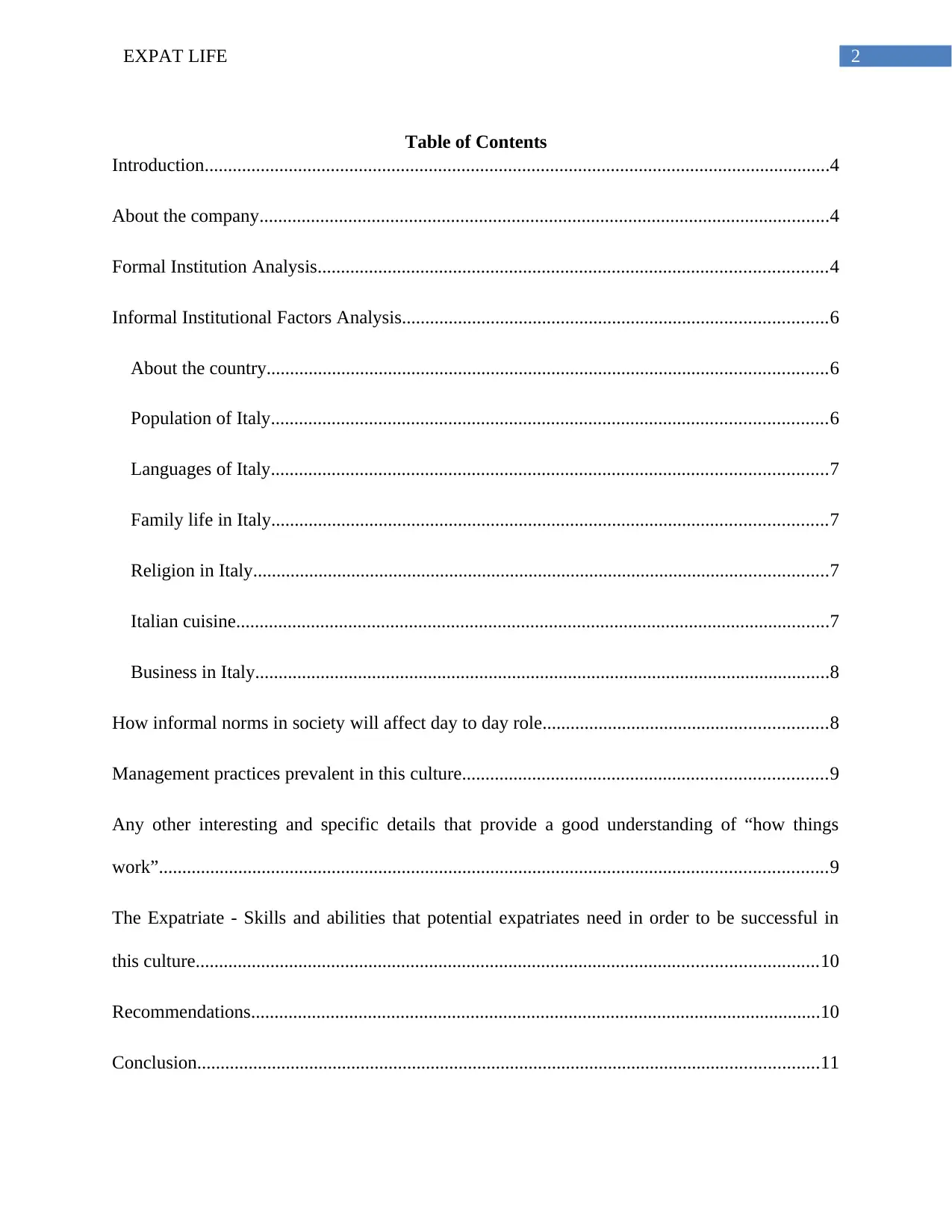
2EXPAT LIFE
Table of Contents
Introduction......................................................................................................................................4
About the company..........................................................................................................................4
Formal Institution Analysis.............................................................................................................4
Informal Institutional Factors Analysis...........................................................................................6
About the country........................................................................................................................6
Population of Italy.......................................................................................................................6
Languages of Italy.......................................................................................................................7
Family life in Italy.......................................................................................................................7
Religion in Italy...........................................................................................................................7
Italian cuisine...............................................................................................................................7
Business in Italy...........................................................................................................................8
How informal norms in society will affect day to day role.............................................................8
Management practices prevalent in this culture..............................................................................9
Any other interesting and specific details that provide a good understanding of “how things
work”...............................................................................................................................................9
The Expatriate - Skills and abilities that potential expatriates need in order to be successful in
this culture.....................................................................................................................................10
Recommendations..........................................................................................................................10
Conclusion.....................................................................................................................................11
Table of Contents
Introduction......................................................................................................................................4
About the company..........................................................................................................................4
Formal Institution Analysis.............................................................................................................4
Informal Institutional Factors Analysis...........................................................................................6
About the country........................................................................................................................6
Population of Italy.......................................................................................................................6
Languages of Italy.......................................................................................................................7
Family life in Italy.......................................................................................................................7
Religion in Italy...........................................................................................................................7
Italian cuisine...............................................................................................................................7
Business in Italy...........................................................................................................................8
How informal norms in society will affect day to day role.............................................................8
Management practices prevalent in this culture..............................................................................9
Any other interesting and specific details that provide a good understanding of “how things
work”...............................................................................................................................................9
The Expatriate - Skills and abilities that potential expatriates need in order to be successful in
this culture.....................................................................................................................................10
Recommendations..........................................................................................................................10
Conclusion.....................................................................................................................................11

3EXPAT LIFE
References......................................................................................................................................12
References......................................................................................................................................12
Secure Best Marks with AI Grader
Need help grading? Try our AI Grader for instant feedback on your assignments.
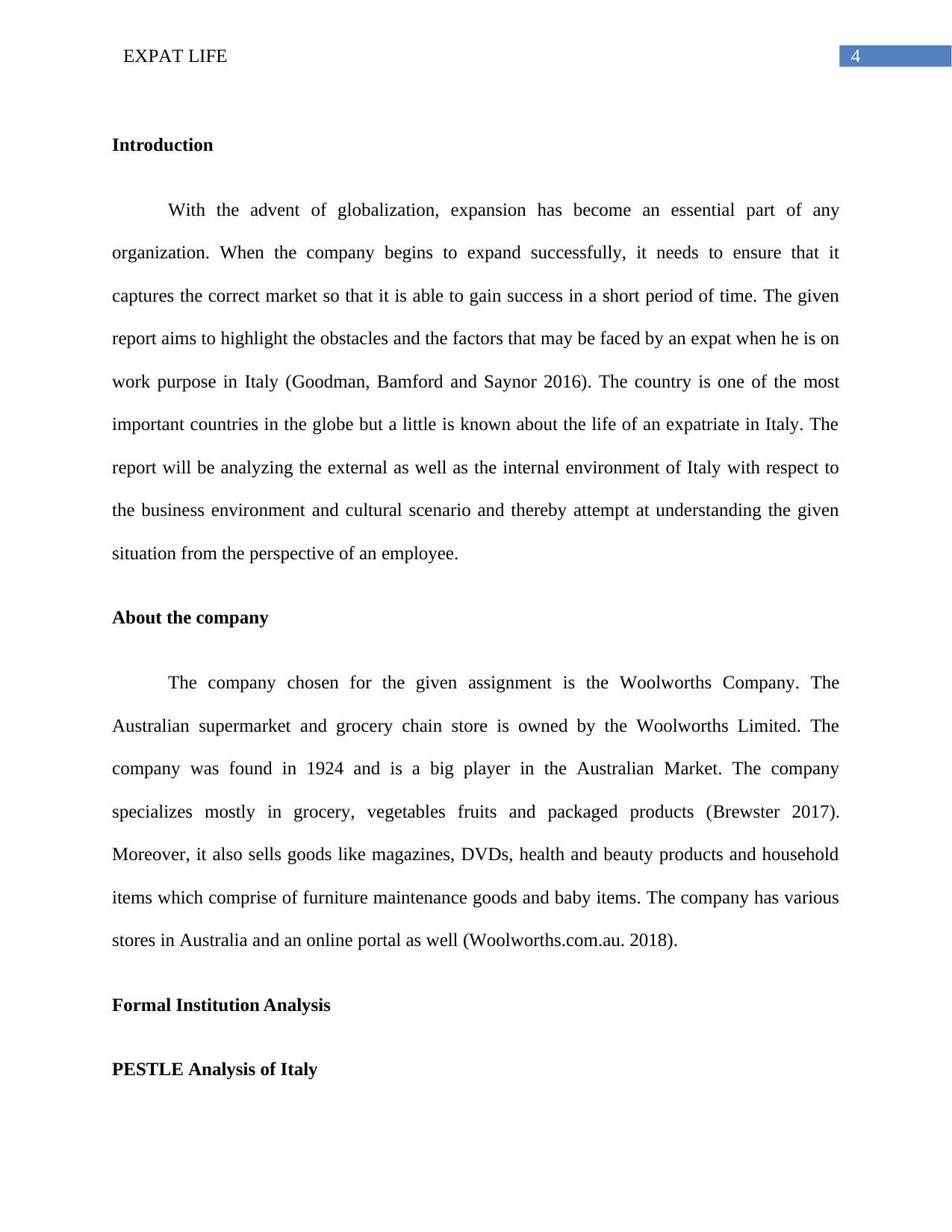
4EXPAT LIFE
Introduction
With the advent of globalization, expansion has become an essential part of any
organization. When the company begins to expand successfully, it needs to ensure that it
captures the correct market so that it is able to gain success in a short period of time. The given
report aims to highlight the obstacles and the factors that may be faced by an expat when he is on
work purpose in Italy (Goodman, Bamford and Saynor 2016). The country is one of the most
important countries in the globe but a little is known about the life of an expatriate in Italy. The
report will be analyzing the external as well as the internal environment of Italy with respect to
the business environment and cultural scenario and thereby attempt at understanding the given
situation from the perspective of an employee.
About the company
The company chosen for the given assignment is the Woolworths Company. The
Australian supermarket and grocery chain store is owned by the Woolworths Limited. The
company was found in 1924 and is a big player in the Australian Market. The company
specializes mostly in grocery, vegetables fruits and packaged products (Brewster 2017).
Moreover, it also sells goods like magazines, DVDs, health and beauty products and household
items which comprise of furniture maintenance goods and baby items. The company has various
stores in Australia and an online portal as well (Woolworths.com.au. 2018).
Formal Institution Analysis
PESTLE Analysis of Italy
Introduction
With the advent of globalization, expansion has become an essential part of any
organization. When the company begins to expand successfully, it needs to ensure that it
captures the correct market so that it is able to gain success in a short period of time. The given
report aims to highlight the obstacles and the factors that may be faced by an expat when he is on
work purpose in Italy (Goodman, Bamford and Saynor 2016). The country is one of the most
important countries in the globe but a little is known about the life of an expatriate in Italy. The
report will be analyzing the external as well as the internal environment of Italy with respect to
the business environment and cultural scenario and thereby attempt at understanding the given
situation from the perspective of an employee.
About the company
The company chosen for the given assignment is the Woolworths Company. The
Australian supermarket and grocery chain store is owned by the Woolworths Limited. The
company was found in 1924 and is a big player in the Australian Market. The company
specializes mostly in grocery, vegetables fruits and packaged products (Brewster 2017).
Moreover, it also sells goods like magazines, DVDs, health and beauty products and household
items which comprise of furniture maintenance goods and baby items. The company has various
stores in Australia and an online portal as well (Woolworths.com.au. 2018).
Formal Institution Analysis
PESTLE Analysis of Italy
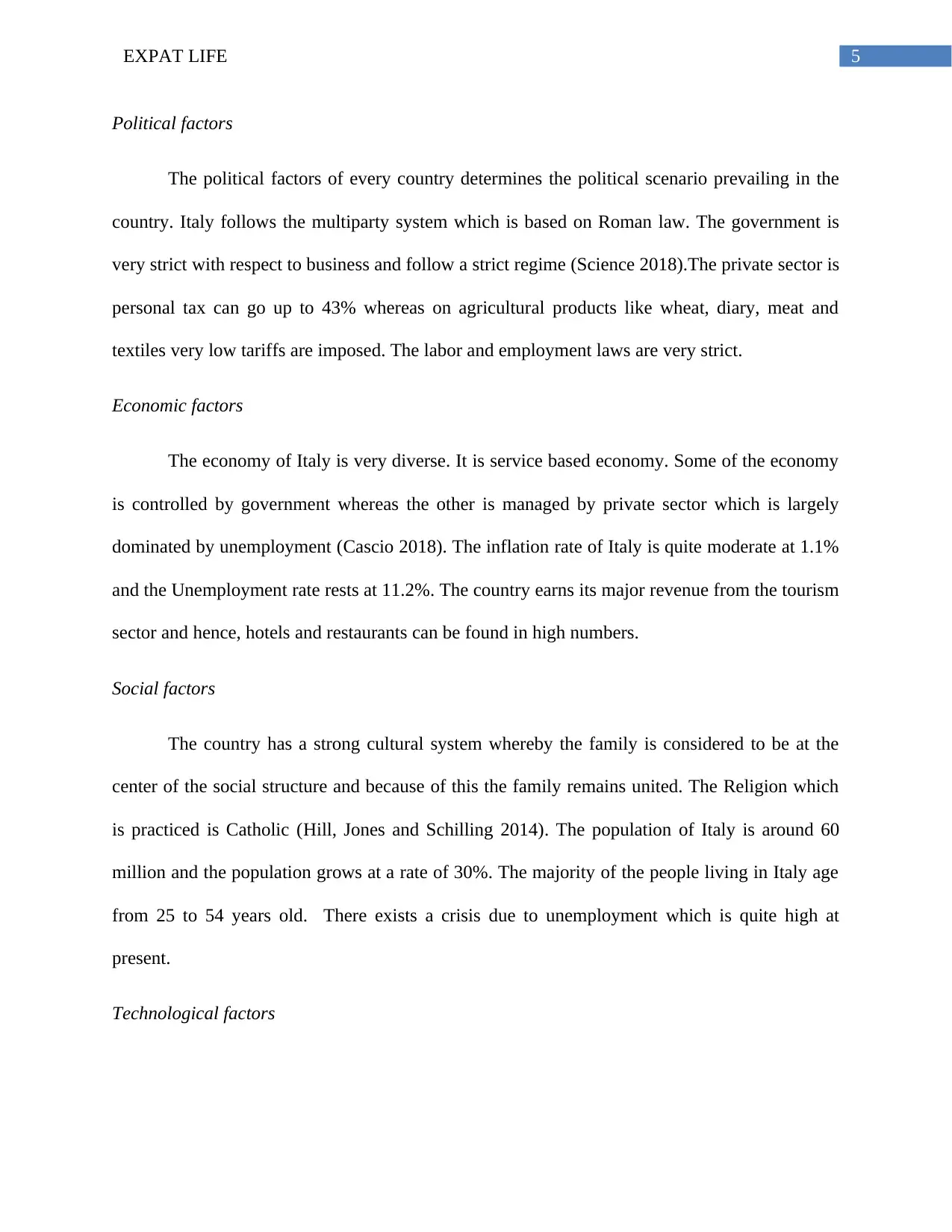
5EXPAT LIFE
Political factors
The political factors of every country determines the political scenario prevailing in the
country. Italy follows the multiparty system which is based on Roman law. The government is
very strict with respect to business and follow a strict regime (Science 2018).The private sector is
personal tax can go up to 43% whereas on agricultural products like wheat, diary, meat and
textiles very low tariffs are imposed. The labor and employment laws are very strict.
Economic factors
The economy of Italy is very diverse. It is service based economy. Some of the economy
is controlled by government whereas the other is managed by private sector which is largely
dominated by unemployment (Cascio 2018). The inflation rate of Italy is quite moderate at 1.1%
and the Unemployment rate rests at 11.2%. The country earns its major revenue from the tourism
sector and hence, hotels and restaurants can be found in high numbers.
Social factors
The country has a strong cultural system whereby the family is considered to be at the
center of the social structure and because of this the family remains united. The Religion which
is practiced is Catholic (Hill, Jones and Schilling 2014). The population of Italy is around 60
million and the population grows at a rate of 30%. The majority of the people living in Italy age
from 25 to 54 years old. There exists a crisis due to unemployment which is quite high at
present.
Technological factors
Political factors
The political factors of every country determines the political scenario prevailing in the
country. Italy follows the multiparty system which is based on Roman law. The government is
very strict with respect to business and follow a strict regime (Science 2018).The private sector is
personal tax can go up to 43% whereas on agricultural products like wheat, diary, meat and
textiles very low tariffs are imposed. The labor and employment laws are very strict.
Economic factors
The economy of Italy is very diverse. It is service based economy. Some of the economy
is controlled by government whereas the other is managed by private sector which is largely
dominated by unemployment (Cascio 2018). The inflation rate of Italy is quite moderate at 1.1%
and the Unemployment rate rests at 11.2%. The country earns its major revenue from the tourism
sector and hence, hotels and restaurants can be found in high numbers.
Social factors
The country has a strong cultural system whereby the family is considered to be at the
center of the social structure and because of this the family remains united. The Religion which
is practiced is Catholic (Hill, Jones and Schilling 2014). The population of Italy is around 60
million and the population grows at a rate of 30%. The majority of the people living in Italy age
from 25 to 54 years old. There exists a crisis due to unemployment which is quite high at
present.
Technological factors
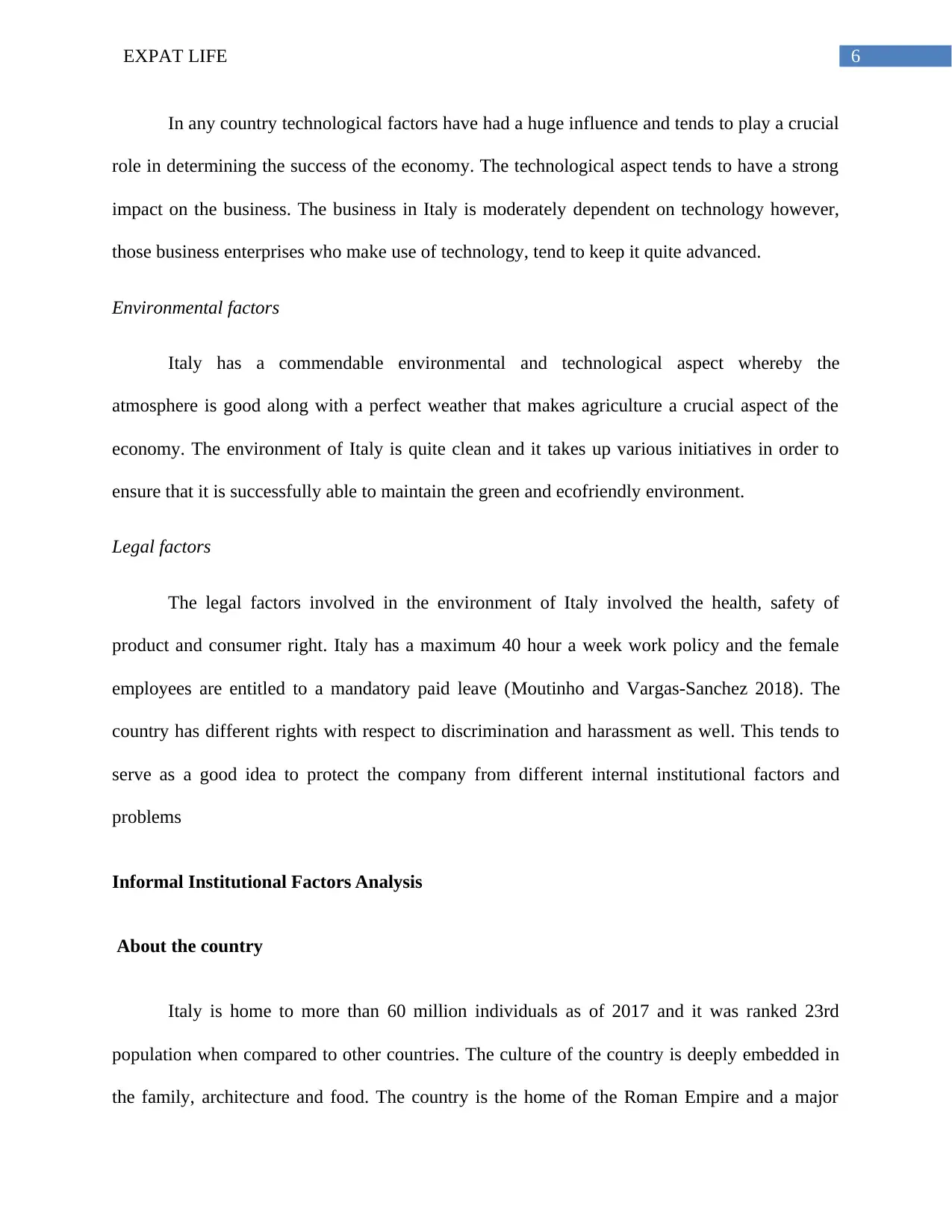
6EXPAT LIFE
In any country technological factors have had a huge influence and tends to play a crucial
role in determining the success of the economy. The technological aspect tends to have a strong
impact on the business. The business in Italy is moderately dependent on technology however,
those business enterprises who make use of technology, tend to keep it quite advanced.
Environmental factors
Italy has a commendable environmental and technological aspect whereby the
atmosphere is good along with a perfect weather that makes agriculture a crucial aspect of the
economy. The environment of Italy is quite clean and it takes up various initiatives in order to
ensure that it is successfully able to maintain the green and ecofriendly environment.
Legal factors
The legal factors involved in the environment of Italy involved the health, safety of
product and consumer right. Italy has a maximum 40 hour a week work policy and the female
employees are entitled to a mandatory paid leave (Moutinho and Vargas-Sanchez 2018). The
country has different rights with respect to discrimination and harassment as well. This tends to
serve as a good idea to protect the company from different internal institutional factors and
problems
Informal Institutional Factors Analysis
About the country
Italy is home to more than 60 million individuals as of 2017 and it was ranked 23rd
population when compared to other countries. The culture of the country is deeply embedded in
the family, architecture and food. The country is the home of the Roman Empire and a major
In any country technological factors have had a huge influence and tends to play a crucial
role in determining the success of the economy. The technological aspect tends to have a strong
impact on the business. The business in Italy is moderately dependent on technology however,
those business enterprises who make use of technology, tend to keep it quite advanced.
Environmental factors
Italy has a commendable environmental and technological aspect whereby the
atmosphere is good along with a perfect weather that makes agriculture a crucial aspect of the
economy. The environment of Italy is quite clean and it takes up various initiatives in order to
ensure that it is successfully able to maintain the green and ecofriendly environment.
Legal factors
The legal factors involved in the environment of Italy involved the health, safety of
product and consumer right. Italy has a maximum 40 hour a week work policy and the female
employees are entitled to a mandatory paid leave (Moutinho and Vargas-Sanchez 2018). The
country has different rights with respect to discrimination and harassment as well. This tends to
serve as a good idea to protect the company from different internal institutional factors and
problems
Informal Institutional Factors Analysis
About the country
Italy is home to more than 60 million individuals as of 2017 and it was ranked 23rd
population when compared to other countries. The culture of the country is deeply embedded in
the family, architecture and food. The country is the home of the Roman Empire and a major
Paraphrase This Document
Need a fresh take? Get an instant paraphrase of this document with our AI Paraphraser
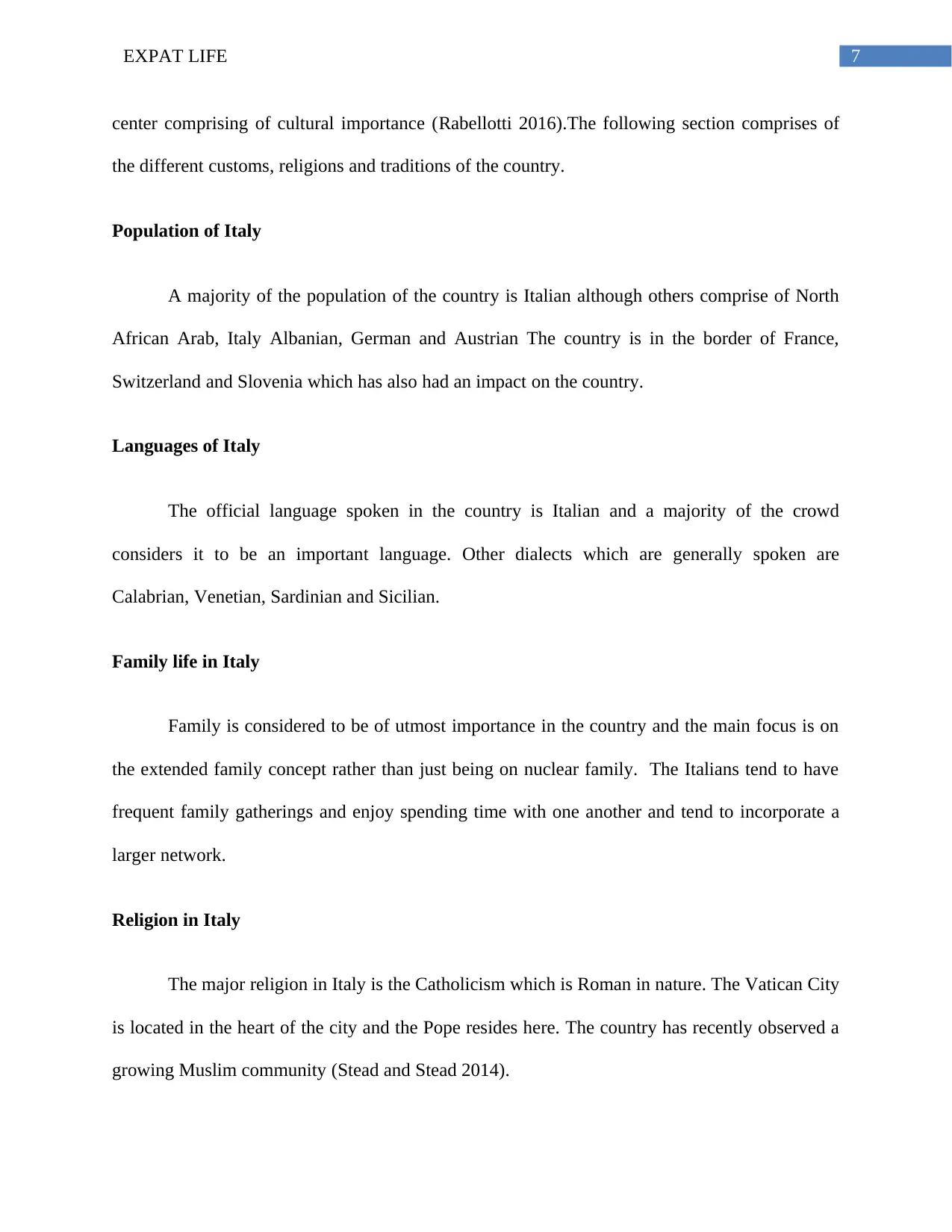
7EXPAT LIFE
center comprising of cultural importance (Rabellotti 2016).The following section comprises of
the different customs, religions and traditions of the country.
Population of Italy
A majority of the population of the country is Italian although others comprise of North
African Arab, Italy Albanian, German and Austrian The country is in the border of France,
Switzerland and Slovenia which has also had an impact on the country.
Languages of Italy
The official language spoken in the country is Italian and a majority of the crowd
considers it to be an important language. Other dialects which are generally spoken are
Calabrian, Venetian, Sardinian and Sicilian.
Family life in Italy
Family is considered to be of utmost importance in the country and the main focus is on
the extended family concept rather than just being on nuclear family. The Italians tend to have
frequent family gatherings and enjoy spending time with one another and tend to incorporate a
larger network.
Religion in Italy
The major religion in Italy is the Catholicism which is Roman in nature. The Vatican City
is located in the heart of the city and the Pope resides here. The country has recently observed a
growing Muslim community (Stead and Stead 2014).
center comprising of cultural importance (Rabellotti 2016).The following section comprises of
the different customs, religions and traditions of the country.
Population of Italy
A majority of the population of the country is Italian although others comprise of North
African Arab, Italy Albanian, German and Austrian The country is in the border of France,
Switzerland and Slovenia which has also had an impact on the country.
Languages of Italy
The official language spoken in the country is Italian and a majority of the crowd
considers it to be an important language. Other dialects which are generally spoken are
Calabrian, Venetian, Sardinian and Sicilian.
Family life in Italy
Family is considered to be of utmost importance in the country and the main focus is on
the extended family concept rather than just being on nuclear family. The Italians tend to have
frequent family gatherings and enjoy spending time with one another and tend to incorporate a
larger network.
Religion in Italy
The major religion in Italy is the Catholicism which is Roman in nature. The Vatican City
is located in the heart of the city and the Pope resides here. The country has recently observed a
growing Muslim community (Stead and Stead 2014).
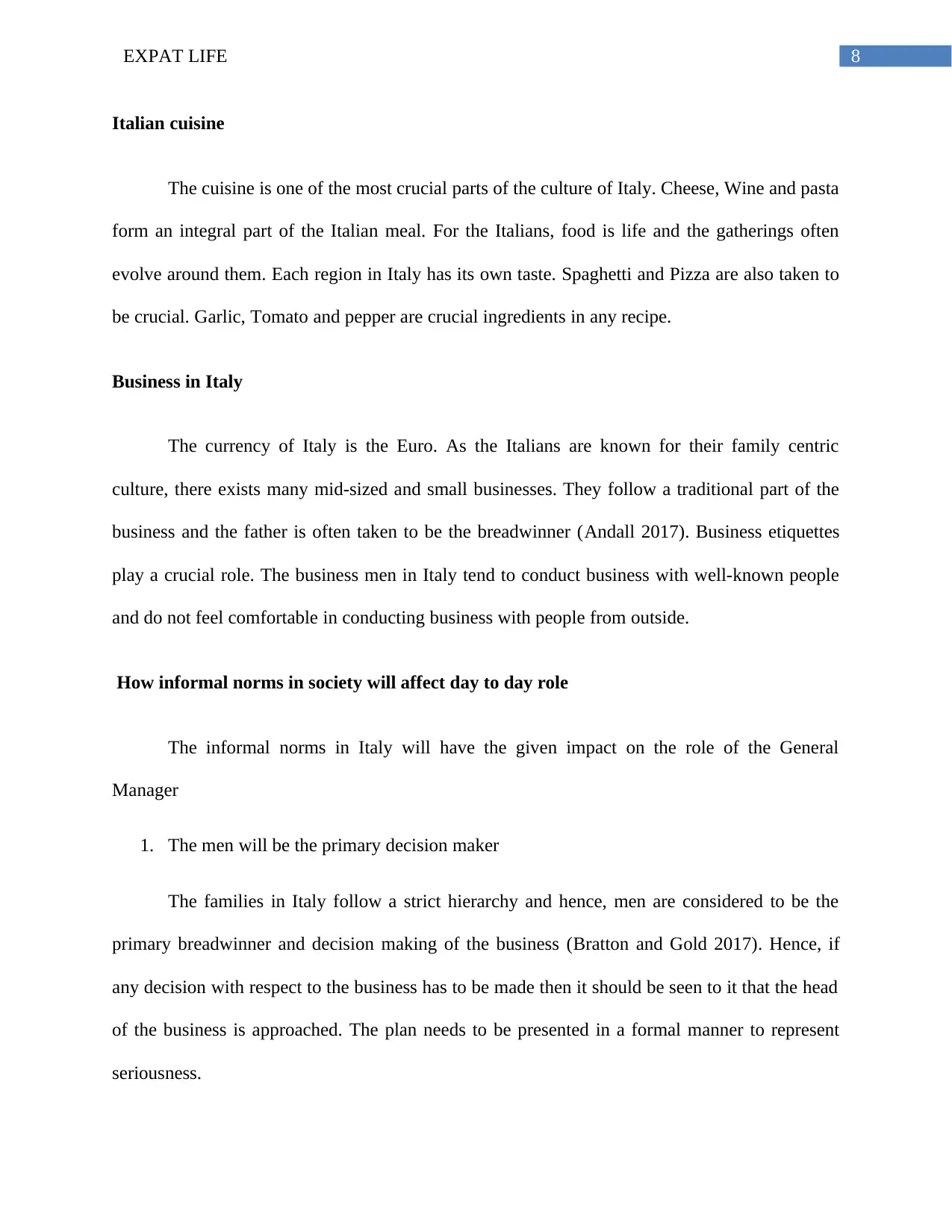
8EXPAT LIFE
Italian cuisine
The cuisine is one of the most crucial parts of the culture of Italy. Cheese, Wine and pasta
form an integral part of the Italian meal. For the Italians, food is life and the gatherings often
evolve around them. Each region in Italy has its own taste. Spaghetti and Pizza are also taken to
be crucial. Garlic, Tomato and pepper are crucial ingredients in any recipe.
Business in Italy
The currency of Italy is the Euro. As the Italians are known for their family centric
culture, there exists many mid-sized and small businesses. They follow a traditional part of the
business and the father is often taken to be the breadwinner (Andall 2017). Business etiquettes
play a crucial role. The business men in Italy tend to conduct business with well-known people
and do not feel comfortable in conducting business with people from outside.
How informal norms in society will affect day to day role
The informal norms in Italy will have the given impact on the role of the General
Manager
1. The men will be the primary decision maker
The families in Italy follow a strict hierarchy and hence, men are considered to be the
primary breadwinner and decision making of the business (Bratton and Gold 2017). Hence, if
any decision with respect to the business has to be made then it should be seen to it that the head
of the business is approached. The plan needs to be presented in a formal manner to represent
seriousness.
Italian cuisine
The cuisine is one of the most crucial parts of the culture of Italy. Cheese, Wine and pasta
form an integral part of the Italian meal. For the Italians, food is life and the gatherings often
evolve around them. Each region in Italy has its own taste. Spaghetti and Pizza are also taken to
be crucial. Garlic, Tomato and pepper are crucial ingredients in any recipe.
Business in Italy
The currency of Italy is the Euro. As the Italians are known for their family centric
culture, there exists many mid-sized and small businesses. They follow a traditional part of the
business and the father is often taken to be the breadwinner (Andall 2017). Business etiquettes
play a crucial role. The business men in Italy tend to conduct business with well-known people
and do not feel comfortable in conducting business with people from outside.
How informal norms in society will affect day to day role
The informal norms in Italy will have the given impact on the role of the General
Manager
1. The men will be the primary decision maker
The families in Italy follow a strict hierarchy and hence, men are considered to be the
primary breadwinner and decision making of the business (Bratton and Gold 2017). Hence, if
any decision with respect to the business has to be made then it should be seen to it that the head
of the business is approached. The plan needs to be presented in a formal manner to represent
seriousness.
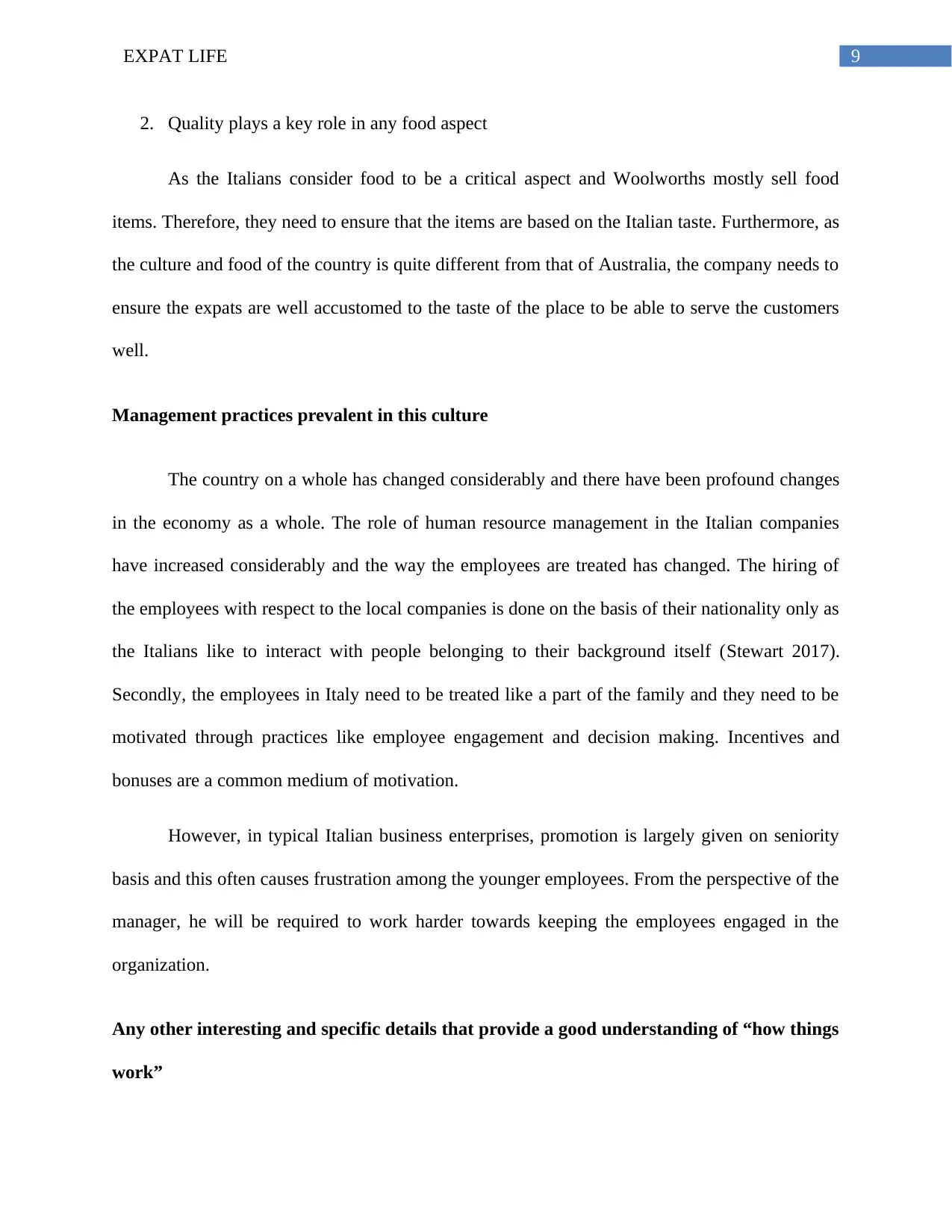
9EXPAT LIFE
2. Quality plays a key role in any food aspect
As the Italians consider food to be a critical aspect and Woolworths mostly sell food
items. Therefore, they need to ensure that the items are based on the Italian taste. Furthermore, as
the culture and food of the country is quite different from that of Australia, the company needs to
ensure the expats are well accustomed to the taste of the place to be able to serve the customers
well.
Management practices prevalent in this culture
The country on a whole has changed considerably and there have been profound changes
in the economy as a whole. The role of human resource management in the Italian companies
have increased considerably and the way the employees are treated has changed. The hiring of
the employees with respect to the local companies is done on the basis of their nationality only as
the Italians like to interact with people belonging to their background itself (Stewart 2017).
Secondly, the employees in Italy need to be treated like a part of the family and they need to be
motivated through practices like employee engagement and decision making. Incentives and
bonuses are a common medium of motivation.
However, in typical Italian business enterprises, promotion is largely given on seniority
basis and this often causes frustration among the younger employees. From the perspective of the
manager, he will be required to work harder towards keeping the employees engaged in the
organization.
Any other interesting and specific details that provide a good understanding of “how things
work”
2. Quality plays a key role in any food aspect
As the Italians consider food to be a critical aspect and Woolworths mostly sell food
items. Therefore, they need to ensure that the items are based on the Italian taste. Furthermore, as
the culture and food of the country is quite different from that of Australia, the company needs to
ensure the expats are well accustomed to the taste of the place to be able to serve the customers
well.
Management practices prevalent in this culture
The country on a whole has changed considerably and there have been profound changes
in the economy as a whole. The role of human resource management in the Italian companies
have increased considerably and the way the employees are treated has changed. The hiring of
the employees with respect to the local companies is done on the basis of their nationality only as
the Italians like to interact with people belonging to their background itself (Stewart 2017).
Secondly, the employees in Italy need to be treated like a part of the family and they need to be
motivated through practices like employee engagement and decision making. Incentives and
bonuses are a common medium of motivation.
However, in typical Italian business enterprises, promotion is largely given on seniority
basis and this often causes frustration among the younger employees. From the perspective of the
manager, he will be required to work harder towards keeping the employees engaged in the
organization.
Any other interesting and specific details that provide a good understanding of “how things
work”
Secure Best Marks with AI Grader
Need help grading? Try our AI Grader for instant feedback on your assignments.
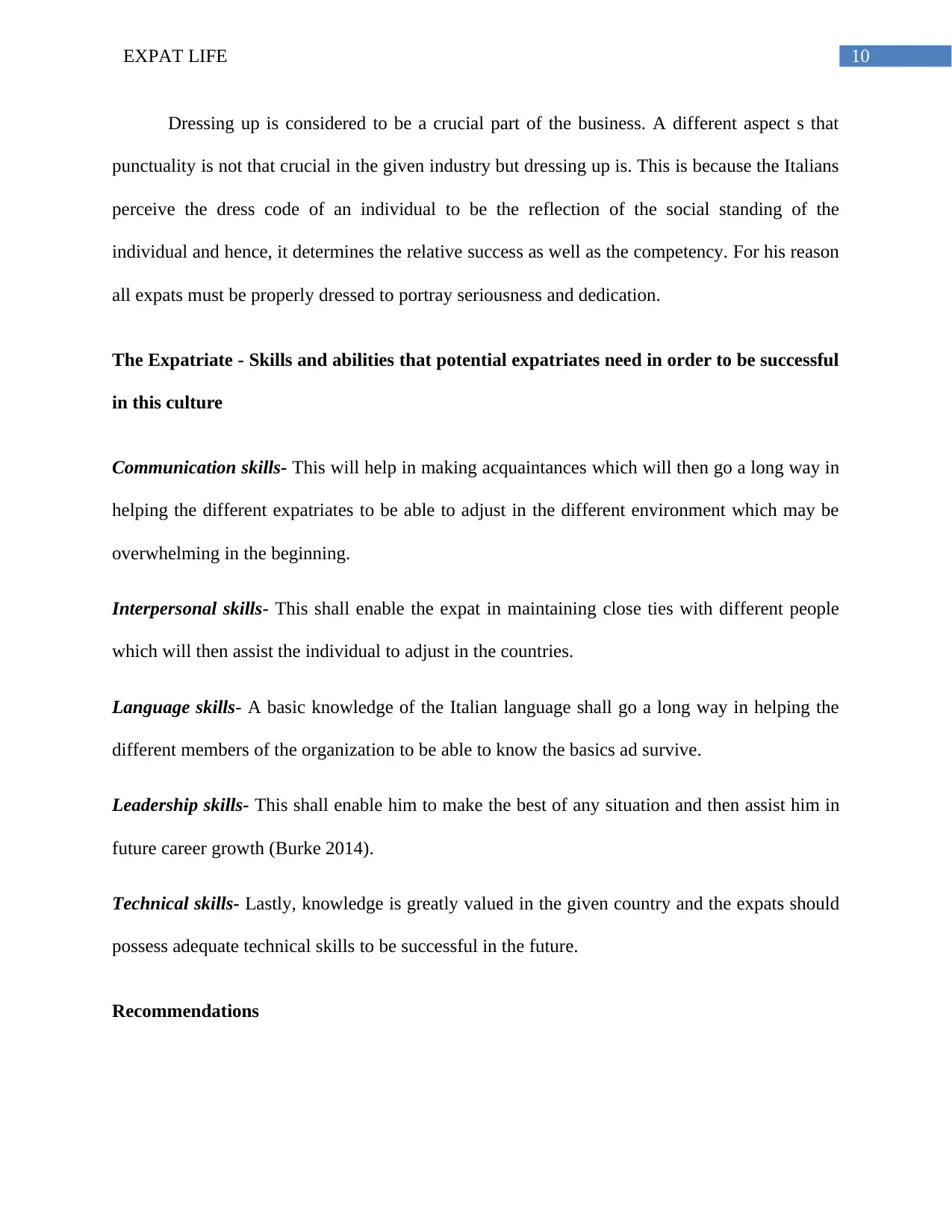
10EXPAT LIFE
Dressing up is considered to be a crucial part of the business. A different aspect s that
punctuality is not that crucial in the given industry but dressing up is. This is because the Italians
perceive the dress code of an individual to be the reflection of the social standing of the
individual and hence, it determines the relative success as well as the competency. For his reason
all expats must be properly dressed to portray seriousness and dedication.
The Expatriate - Skills and abilities that potential expatriates need in order to be successful
in this culture
Communication skills- This will help in making acquaintances which will then go a long way in
helping the different expatriates to be able to adjust in the different environment which may be
overwhelming in the beginning.
Interpersonal skills- This shall enable the expat in maintaining close ties with different people
which will then assist the individual to adjust in the countries.
Language skills- A basic knowledge of the Italian language shall go a long way in helping the
different members of the organization to be able to know the basics ad survive.
Leadership skills- This shall enable him to make the best of any situation and then assist him in
future career growth (Burke 2014).
Technical skills- Lastly, knowledge is greatly valued in the given country and the expats should
possess adequate technical skills to be successful in the future.
Recommendations
Dressing up is considered to be a crucial part of the business. A different aspect s that
punctuality is not that crucial in the given industry but dressing up is. This is because the Italians
perceive the dress code of an individual to be the reflection of the social standing of the
individual and hence, it determines the relative success as well as the competency. For his reason
all expats must be properly dressed to portray seriousness and dedication.
The Expatriate - Skills and abilities that potential expatriates need in order to be successful
in this culture
Communication skills- This will help in making acquaintances which will then go a long way in
helping the different expatriates to be able to adjust in the different environment which may be
overwhelming in the beginning.
Interpersonal skills- This shall enable the expat in maintaining close ties with different people
which will then assist the individual to adjust in the countries.
Language skills- A basic knowledge of the Italian language shall go a long way in helping the
different members of the organization to be able to know the basics ad survive.
Leadership skills- This shall enable him to make the best of any situation and then assist him in
future career growth (Burke 2014).
Technical skills- Lastly, knowledge is greatly valued in the given country and the expats should
possess adequate technical skills to be successful in the future.
Recommendations
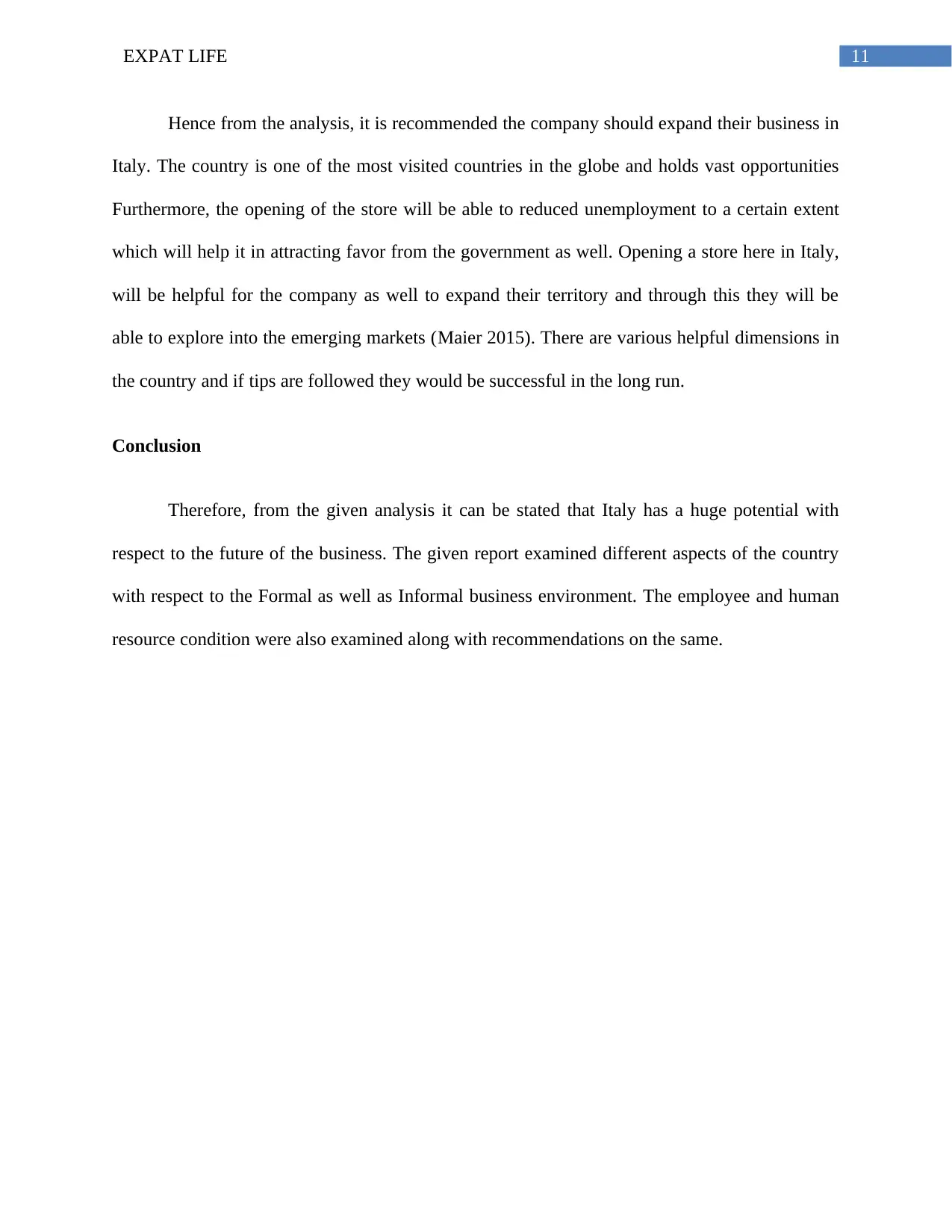
11EXPAT LIFE
Hence from the analysis, it is recommended the company should expand their business in
Italy. The country is one of the most visited countries in the globe and holds vast opportunities
Furthermore, the opening of the store will be able to reduced unemployment to a certain extent
which will help it in attracting favor from the government as well. Opening a store here in Italy,
will be helpful for the company as well to expand their territory and through this they will be
able to explore into the emerging markets (Maier 2015). There are various helpful dimensions in
the country and if tips are followed they would be successful in the long run.
Conclusion
Therefore, from the given analysis it can be stated that Italy has a huge potential with
respect to the future of the business. The given report examined different aspects of the country
with respect to the Formal as well as Informal business environment. The employee and human
resource condition were also examined along with recommendations on the same.
Hence from the analysis, it is recommended the company should expand their business in
Italy. The country is one of the most visited countries in the globe and holds vast opportunities
Furthermore, the opening of the store will be able to reduced unemployment to a certain extent
which will help it in attracting favor from the government as well. Opening a store here in Italy,
will be helpful for the company as well to expand their territory and through this they will be
able to explore into the emerging markets (Maier 2015). There are various helpful dimensions in
the country and if tips are followed they would be successful in the long run.
Conclusion
Therefore, from the given analysis it can be stated that Italy has a huge potential with
respect to the future of the business. The given report examined different aspects of the country
with respect to the Formal as well as Informal business environment. The employee and human
resource condition were also examined along with recommendations on the same.
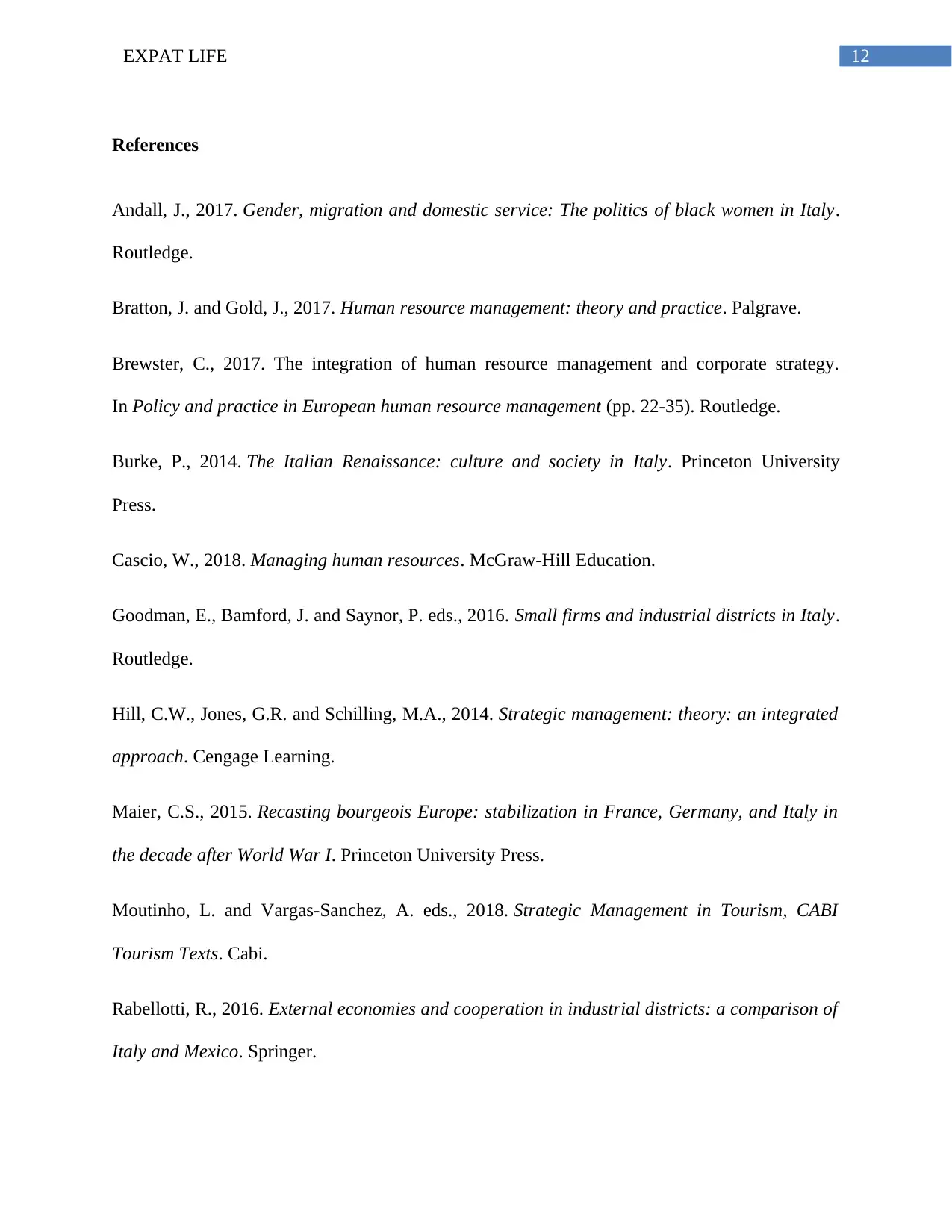
12EXPAT LIFE
References
Andall, J., 2017. Gender, migration and domestic service: The politics of black women in Italy.
Routledge.
Bratton, J. and Gold, J., 2017. Human resource management: theory and practice. Palgrave.
Brewster, C., 2017. The integration of human resource management and corporate strategy.
In Policy and practice in European human resource management (pp. 22-35). Routledge.
Burke, P., 2014. The Italian Renaissance: culture and society in Italy. Princeton University
Press.
Cascio, W., 2018. Managing human resources. McGraw-Hill Education.
Goodman, E., Bamford, J. and Saynor, P. eds., 2016. Small firms and industrial districts in Italy.
Routledge.
Hill, C.W., Jones, G.R. and Schilling, M.A., 2014. Strategic management: theory: an integrated
approach. Cengage Learning.
Maier, C.S., 2015. Recasting bourgeois Europe: stabilization in France, Germany, and Italy in
the decade after World War I. Princeton University Press.
Moutinho, L. and Vargas-Sanchez, A. eds., 2018. Strategic Management in Tourism, CABI
Tourism Texts. Cabi.
Rabellotti, R., 2016. External economies and cooperation in industrial districts: a comparison of
Italy and Mexico. Springer.
References
Andall, J., 2017. Gender, migration and domestic service: The politics of black women in Italy.
Routledge.
Bratton, J. and Gold, J., 2017. Human resource management: theory and practice. Palgrave.
Brewster, C., 2017. The integration of human resource management and corporate strategy.
In Policy and practice in European human resource management (pp. 22-35). Routledge.
Burke, P., 2014. The Italian Renaissance: culture and society in Italy. Princeton University
Press.
Cascio, W., 2018. Managing human resources. McGraw-Hill Education.
Goodman, E., Bamford, J. and Saynor, P. eds., 2016. Small firms and industrial districts in Italy.
Routledge.
Hill, C.W., Jones, G.R. and Schilling, M.A., 2014. Strategic management: theory: an integrated
approach. Cengage Learning.
Maier, C.S., 2015. Recasting bourgeois Europe: stabilization in France, Germany, and Italy in
the decade after World War I. Princeton University Press.
Moutinho, L. and Vargas-Sanchez, A. eds., 2018. Strategic Management in Tourism, CABI
Tourism Texts. Cabi.
Rabellotti, R., 2016. External economies and cooperation in industrial districts: a comparison of
Italy and Mexico. Springer.
Paraphrase This Document
Need a fresh take? Get an instant paraphrase of this document with our AI Paraphraser
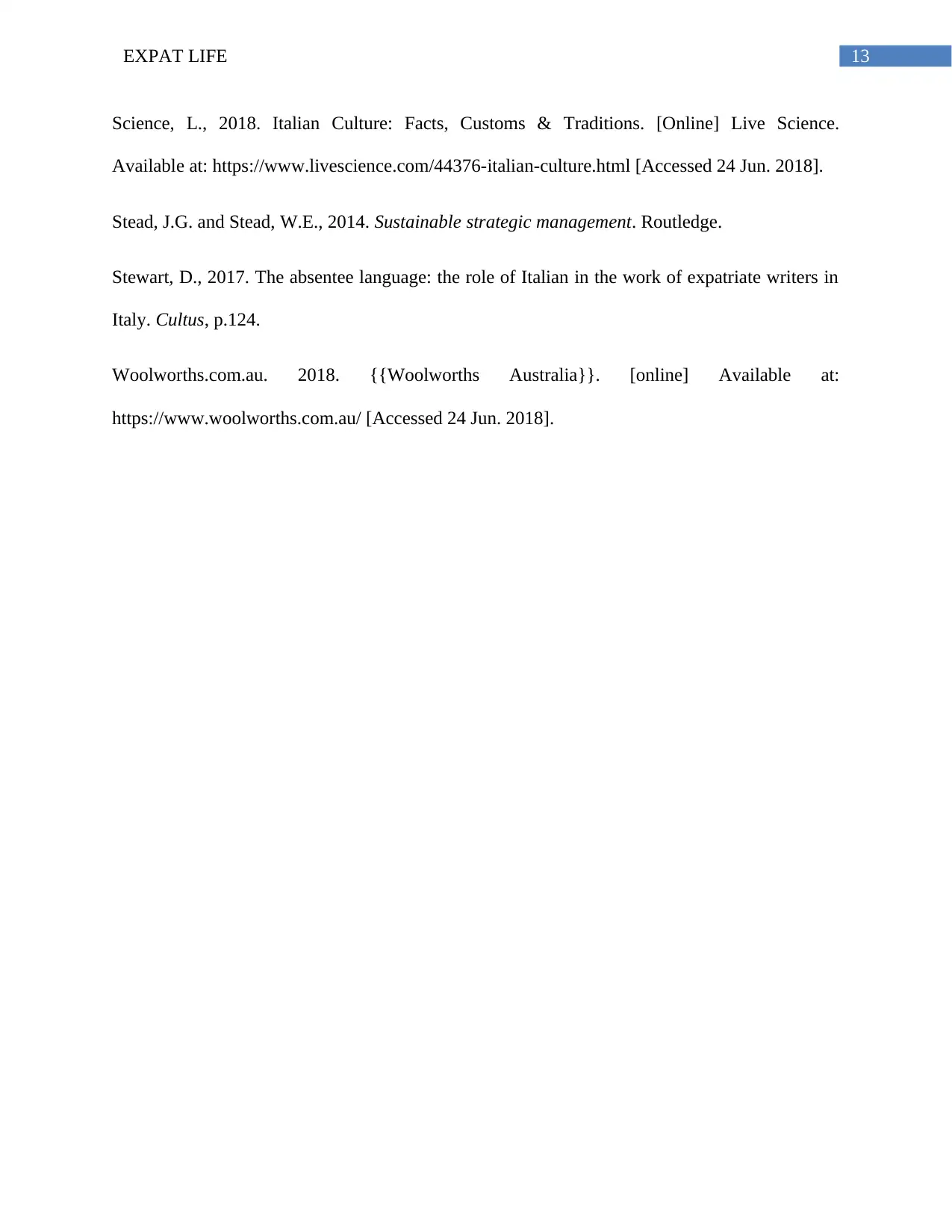
13EXPAT LIFE
Science, L., 2018. Italian Culture: Facts, Customs & Traditions. [Online] Live Science.
Available at: https://www.livescience.com/44376-italian-culture.html [Accessed 24 Jun. 2018].
Stead, J.G. and Stead, W.E., 2014. Sustainable strategic management. Routledge.
Stewart, D., 2017. The absentee language: the role of Italian in the work of expatriate writers in
Italy. Cultus, p.124.
Woolworths.com.au. 2018. {{Woolworths Australia}}. [online] Available at:
https://www.woolworths.com.au/ [Accessed 24 Jun. 2018].
Science, L., 2018. Italian Culture: Facts, Customs & Traditions. [Online] Live Science.
Available at: https://www.livescience.com/44376-italian-culture.html [Accessed 24 Jun. 2018].
Stead, J.G. and Stead, W.E., 2014. Sustainable strategic management. Routledge.
Stewart, D., 2017. The absentee language: the role of Italian in the work of expatriate writers in
Italy. Cultus, p.124.
Woolworths.com.au. 2018. {{Woolworths Australia}}. [online] Available at:
https://www.woolworths.com.au/ [Accessed 24 Jun. 2018].
1 out of 14
Related Documents
Your All-in-One AI-Powered Toolkit for Academic Success.
+13062052269
info@desklib.com
Available 24*7 on WhatsApp / Email
![[object Object]](/_next/static/media/star-bottom.7253800d.svg)
Unlock your academic potential
© 2024 | Zucol Services PVT LTD | All rights reserved.





